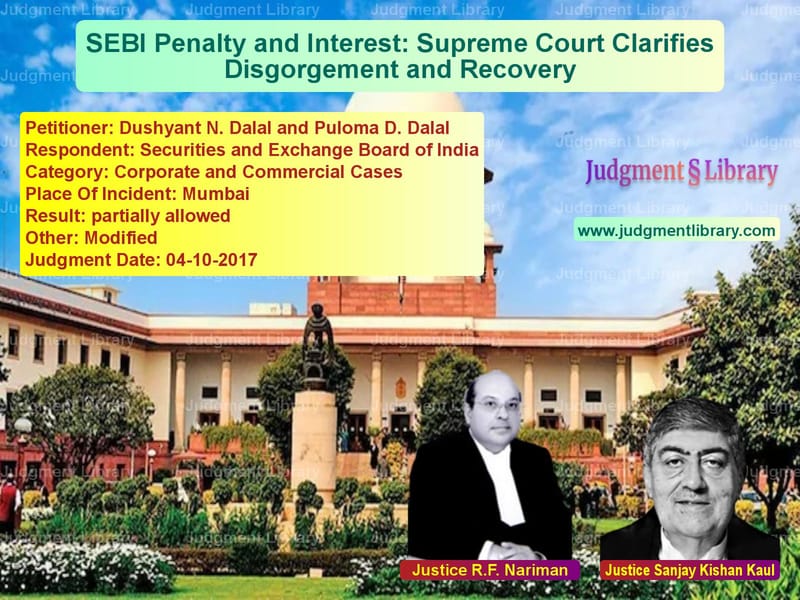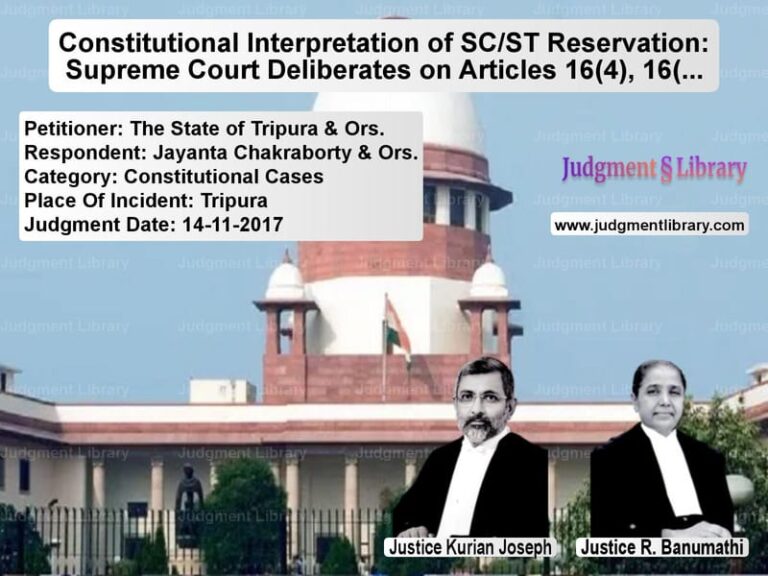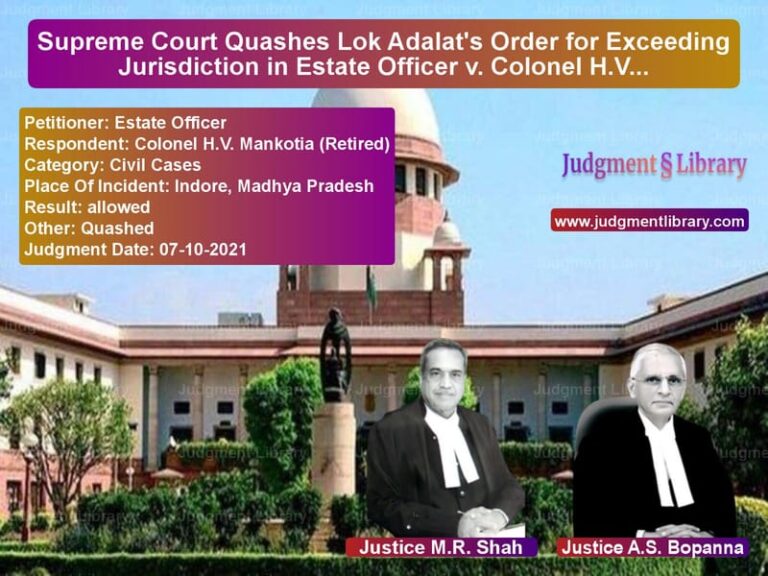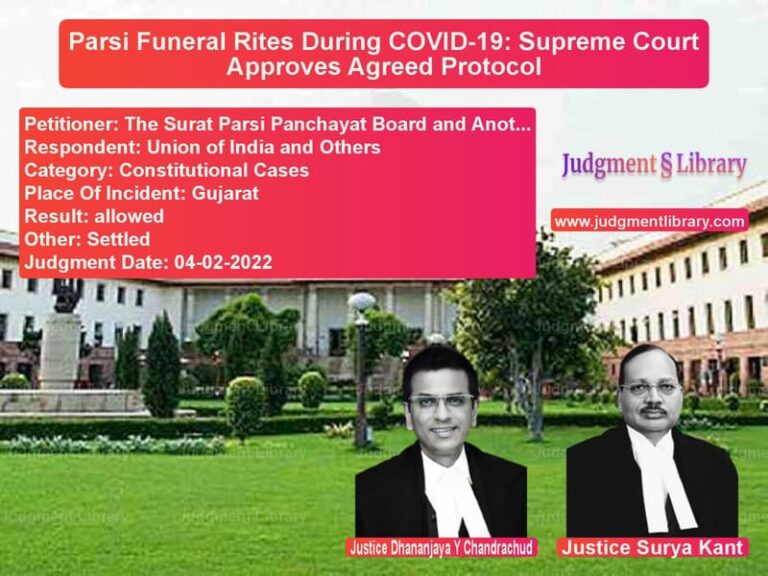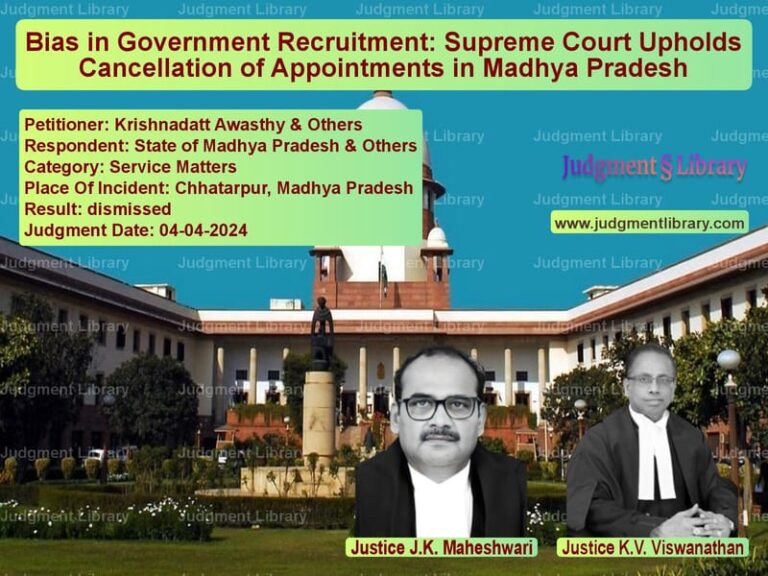SEBI Penalty and Interest: Supreme Court Clarifies Disgorgement and Recovery
The Supreme Court of India recently ruled in the case of Dushyant N. Dalal & Anr. vs. Securities and Exchange Board of India (SEBI), addressing key issues related to penalty, interest, and the recovery of unlawful gains in securities market violations. The case primarily revolved around whether interest could be recovered on penalty and disgorgement orders under Section 28A of the Securities and Exchange Board of India Act, 1992 (SEBI Act). This ruling provides a crucial precedent in financial and securities law.
The case involved two distinct categories:
- Disgorgement of unlawful gains: The appellants, Dushyant N. Dalal and Puloma D. Dalal, were ordered to return gains obtained through manipulative practices in Initial Public Offerings (IPOs).
- Penalty for unfair trade practices: SEBI sought interest on penalties imposed on other individuals for fraudulent activities.
The Supreme Court ruled that while SEBI could charge interest on penalties post the 2013 amendment to the SEBI Act, interest on disgorgement amounts was not applicable where SEBI had not expressly stated future interest at the time of the original order.
Background of the Case
The case stemmed from fraudulent trading practices in IPOs, where the appellants allegedly manipulated demand for shares reserved for retail investors, thereby making unlawful gains. The SEBI order, dated July 21, 2009, found that:
- The appellants gained Rs. 4.05 crores through deceptive practices.
- They violated Section 12A of the SEBI Act and relevant provisions of the Prohibition of Fraudulent and Unfair Trade Practices Regulations, 2003 (PFUTP Regulations).
- They were ordered to disgorge Rs. 4.05 crores plus Rs. 1.95 crores as simple interest at 12% for the period 2005–2009.
- Failure to comply would result in a 7-year market ban.
The Securities Appellate Tribunal (SAT) upheld SEBI’s decision, and an appeal to the Supreme Court was dismissed in February 2011. However, in 2013, SEBI issued a demand notice, requiring the appellants to pay interest from 2009 onwards, citing Section 28A of the SEBI Act.
Arguments of the Appellants
The appellants, Dushyant N. Dalal and Puloma D. Dalal, challenged the demand for additional interest, arguing that:
- The SEBI order did not specify future interest beyond 2005–2009.
- SEBI’s demand for interest from 2009 to 2013 was an afterthought.
- Since the 2009 order imposed a market ban for 7 years upon non-payment, this penalty already served as a consequence of delayed payment.
Arguments of SEBI
SEBI contended that:
- Under Section 28A, interest on unpaid amounts (whether penalty or disgorgement) was due and payable.
- The appellants continued to retain the money unlawfully and should compensate the market by paying interest.
- The amendments in 2013 allowed SEBI to recover interest similar to the Income Tax Act provisions.
Supreme Court’s Key Findings
The Supreme Court ruled that:
“If there is default in payment of Rs. 6 crores within the stipulated time, no future interest is payable, inasmuch as a much severer penalty of being debarred from the market for 7 years was instead imposed.”
Further, the Court emphasized:
- In penalty cases, SEBI can charge interest from July 18, 2013, when Section 28A came into effect.
- For disgorgement cases, SEBI cannot retrospectively charge interest unless explicitly mentioned in the original order.
Final Judgment
The Supreme Court concluded:
- Allowed interest on penalties from July 18, 2013, onwards.
- Set aside interest on disgorgement beyond 2009, as SEBI had not specified it earlier.
- Restored the SAT ruling for penalties but overturned additional interest demands in the disgorgement case.
Key Takeaways from the Judgment
This ruling establishes crucial financial regulatory principles:
- Limited Retrospective Application: Section 28A applies only from July 18, 2013, and cannot impose retrospective interest beyond what was stated in original orders.
- Disgorgement vs. Penalty: SEBI cannot impose interest on disgorgement unless specifically mentioned, but penalties attract interest under Section 220 of the Income Tax Act.
- Public Interest: The judgment reinforces the principle that unlawful gains should not benefit wrongdoers, but also limits excessive penalties.
Legal Implications of the Judgment
This ruling has significant implications for financial and securities law:
- SEBI must clearly define interest obligations in its penalty and disgorgement orders.
- Investors and market participants gain clarity on regulatory enforcement and penalty structures.
- Precedent for financial regulators: Other financial regulators may follow similar principles when imposing penalties and recovering funds.
Conclusion
The Supreme Court’s ruling in Dushyant N. Dalal & Anr. vs. SEBI is a landmark decision balancing regulatory enforcement with fairness in financial markets. By upholding interest on penalties but limiting retrospective charges on disgorgement, the Court provides a structured approach to financial penalties under the SEBI Act. This case will serve as a guiding principle for future securities law enforcement.
Don’t miss out on the full details! Download the complete judgment in PDF format below and gain valuable insights instantly!
Download Judgment: Dushyant N. Dalal an vs Securities and Excha Supreme Court of India Judgment Dated 04-10-2017.pdf
Direct Downlaod Judgment: Direct downlaod this Judgment
See all petitions in Company Law
See all petitions in Corporate Compliance
See all petitions in unfair trade practices
See all petitions in Judgment by Rohinton Fali Nariman
See all petitions in Judgment by Sanjay Kishan Kaul
See all petitions in partially allowed
See all petitions in Modified
See all petitions in supreme court of India judgments October 2017
See all petitions in 2017 judgments
See all posts in Corporate and Commercial Cases Category
See all allowed petitions in Corporate and Commercial Cases Category
See all Dismissed petitions in Corporate and Commercial Cases Category
See all partially allowed petitions in Corporate and Commercial Cases Category

